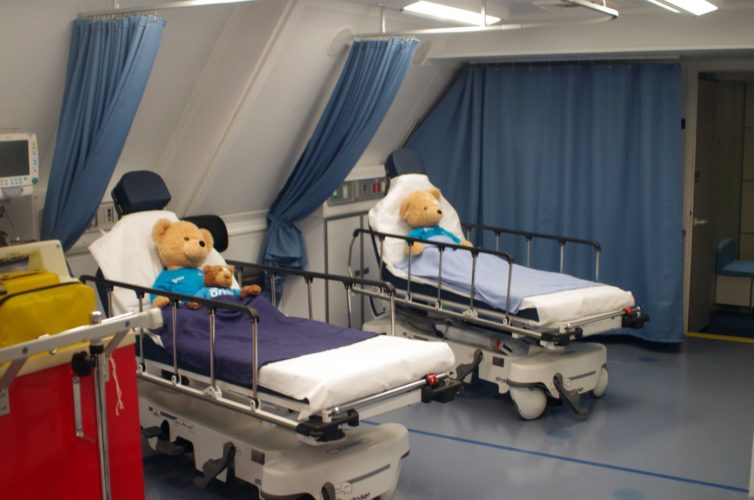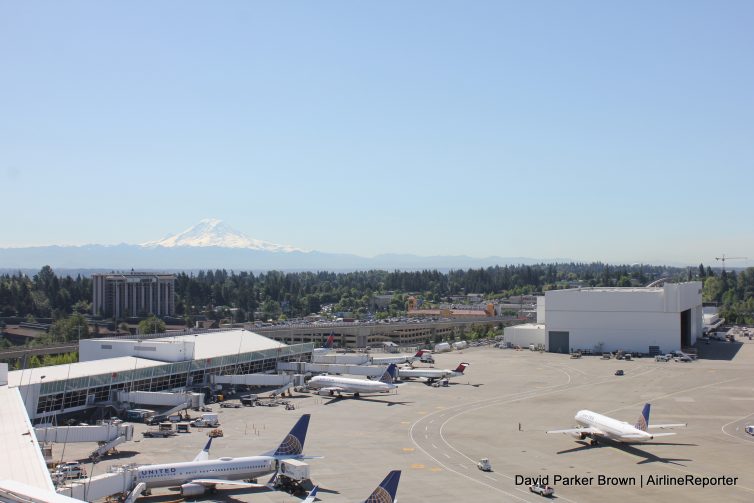AUTHOR’S NOTE: The COVID-19 pandemic has progressed significantly since this story was published at the beginning of March and recommendations for travel have changed. Please consult more recent guidance from government authorities in informing your plans.
COVID-19: It’s here, it’s spreading, and it has people very worried. Public health authorities everywhere are hard at work containing this newest coronavirus strain, but the global ripple effects are already huge. And as with previous infectious disease outbreaks air travel is getting a lot of scrutiny as a potential means of disease spread across borders.

Feeling stressed? Here’s two adorable teddy bears on a flying hospital on an MD-11 – Photo: Orbis International
There’s no certainty about how far the disease will spread and how the aviation world will respond. But since some of you may have trips on the books or plans in the works, I wanted to take a brief moment to share some thoughts and resources. We discuss the basics of the virus, the level of risk if you fly during the epidemic, how to reduce your risk, whether you need to change your flight plans, and how coronavirus is impacting the aviation industry.
Before we dive into things, two big caveats:
- I’m a physician in my day job, but I’m NOT a trained public health professional or an infectious disease specialist. You should be paying closest attention to the updates and recommendations of trustworthy sources like the CDC and WHO.
- This story is evolving fast, so no guarantees that everything in here is up to date at the time you read this.
Read on for a quick take on the state of flying in the era of COVID-19, and what the epidemic may mean for you.
What is COVID-19?
It’s the formal name of the epidemic caused by a member of a family of coronaviruses. Other coronaviruses were responsible for the SARS and MERS epidemics earlier in the 2000s. Still other coronaviruses are responsible for more common, milder respiratory infections. If you want more info on the basics of the disease, the CDC has a great webpage with tons of answers to common COVID-19 questions.
How worried should I be about COVID-19?
Your level of concern over COVID-19 — or really any infectious disease — mostly depends on two factors: (1) how contagious the disease is, and (2) how sick it can make you once you’re infected. For the first question, we know that COVID-19 is fairly contagious. Per the WHO it’s most likely spread either by respiratory droplets, produced when people breathe or cough, or if infected individuals deposit virus on surfaces that other people touch later. Early studies suggest that people are contagious from very early in the course of their infection. The same is true for the yearly flu, which is why is spreads so quickly each year.
As for the severity of the COVID-19 illness if you are infected, there’s good news and bad news. The overall risk of serious illness or death looks higher than for the yearly flu. But the risk is likely lower than for SARS. Want specifics? One way to measure the deadliness of a disease is the case-fatality rate, or the percentage of people who have the disease who die from it. In recent years for the flu the rate has been around 0.1%. SARS’ rate was around 10%. Data is still being collected for COVID-19, but at least in China a study found the rate to be between 2% and 3%. The same study found that four out of five people infected have only mild symptoms that usually don’t require hospitalization. The risk of bad outcomes like ICU admission, requiring a breathing tube, or death is higher if you are older, have pulmonary conditions, or have an impaired immune system.
What’s my risk of getting infected if I fly?
Short answer: nobody knows for sure. Aircraft and airports involve cramming a lot of people into a small space, so compared with being outdoors or at home, the risk of catching an illness is relatively high. The risk is probably manageable if you’re flying between places with few to no cases. There’s lots of pseudoscience flying around about how to reduce the risk of infection. But the best and most proven way to reduce the risk is to wash your hands with soap or use an alcohol-based sanitizer, to avoid touching your face with your hands, to not dally around areas with large crowds of people, and to wipe down shared surfaces.
So am I safe if I’m flying to areas unaffected by COVID-19?
UPDATE 3/16: THE US CDC NOW RECOMMENDS AGAINST ANY NON-ESSENTIAL TRAVEL
Maybe, but with two big caveats. First, the infection could spread between the time you book a ticket and the time you fly. And second, from a practical perspective, the next few months will involve a lot of unpredictability in the airline world. As the disease spreads, airlines will continue axing flights. You really don’t want to get stranded somewhere if a local outbreak erupts while you’re there. Conferences and business events are getting cancelled all over the place, so business travelers may have fewer reasons to fly. Even if I was somehow totally immune to COVID-19, just the worrying about whether my flight would be canceled and the hassle of monitoring all the travel alerts might prompt me to stay at home.

Many Chinese airlines have been effected by COVID-19 – Photo: Jeremy Dwyer-Lindgren | JDL Multimedia
What should I do if I have a flight booked already?
UPDATE 3/16: THE US CDC NOW RECOMMENDS AGAINST ANY NON-ESSENTIAL TRAVEL. AIRLINES HAVE BROADLY WAIVED CHANGE/CANCELLATION FEES AND IF AT ALL POSSIBLE YOU SHOULD CANCEL ANY PLANNED TRAVEL IN THE COMING MONTH.
For flights coming up soon to low-risk, currently uninfected locations you can consider managing the risk by following the healthy practices I mentioned above. For travel to areas with COVID-19 rampant in the community, chances are your flight has already been cancelled. If not, it’s worth taking advantage of the growing number of airlines offering waivers on change/cancelation fees. There are some intermediate-risk situations like travel to New York or California — areas where there’s some coronavirus around but it’s not widespread at all. In those cases you’re probably fine for now, but there’s no one-size-fits-all answer. You’ll have to weigh the value and urgency of the trip against your risk, which depends on the activities you’ll be participating in while you travel as well as your age and medical conditions.
If I recently traveled to an area with widespread coronavirus and now have symptoms, or if I was exposed to someone with a known coronavirus infection, is it ok for me to fly?
NO. Please call your healthcare provider instead.
What does this mean for the airlines?
The industry is coming off a few years of generally good times. COVID-19 is definitely going to be especially rough for the industry, and their stocks are starting to get hit hard. Lots of routes have been suspended and more suspensions are likely as the disease spreads. Onboard service may see cuts, both to cut losses and to protect flight crews from excessive exposure. I’m not going to prognosticate about how bad things could get for the airlines, but here’s hoping they can weather the storm.
Want to learn more?
If you take nothing else away from this, please make use of these excellent and trustworthy resources:
- US CDC Travel Advisories
- US State Department Travel Advisories
- World Health Organization COVID-19 Travel Information
- Johns Hopkins Live Map of Coronavirus Cases
All of us at AirlineReporter hope you stay safe, healthy, and comfortable as this story plays out.
We welcome your thoughts in the comments section below. Please be kind to your fellow commenters and avoid posting unfounded claims or information from unreliable sources.

What “www-address” I can use to get informations about the “Corona-handling” when using the airports ADD (Ethiopia) and/or MBA (Mombasa) in Africa? Thank you for your assistance … R .Volker Weggenmann, Frankfurt/Germany